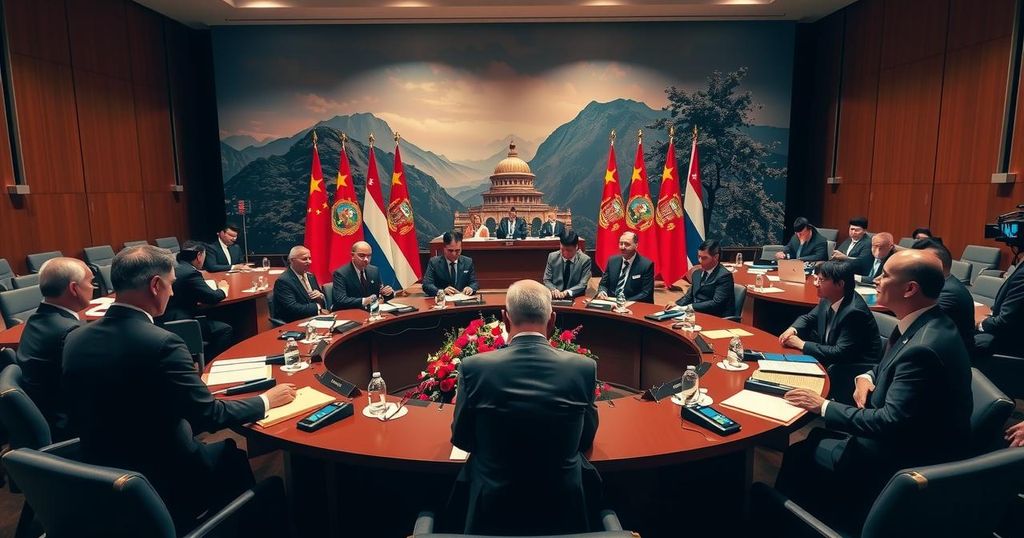Biden’s Diminished Influence at APEC as China Expands Its Reach in Latin America

At the APEC Forum, President Biden was overshadowed by Chinese President Xi Jinping, who emphasized China’s cultural and economic ties with Peru. This marked a significant moment reflecting changing power dynamics in Latin America, where China has invested heavily, leaving the U.S. lagging in engagement and strategy. Political challenges in Peru complicate U.S. relations, while opportunities for stronger economic ties with Latin America appear compromised under the Biden administration.
At the recent Asia-Pacific Economic Cooperation (APEC) Forum, President Joe Biden found himself somewhat overshadowed as Chinese President Xi Jinping took center stage in a prominent photo alongside Dina Boluarte, Peru’s president. This imagery seemingly reflected a broader narrative concerning the shifting influence within the region, which has historically been seen as a stronghold for American diplomacy. Biden’s first visit to South America was marked by a palpable focus on China, characterized by Xi’s cultivation of ties with Peru, underscored by recent investments into infrastructure projects through initiatives such as China’s Belt and Road initiative. Xi Jinping showcased engaging with Peru’s rich cultural heritage, reinforcing the longstanding connection stemming from a significant Chinese community present in the country. He remarked upon this bond in an op-ed, stating, “Each time I am in this beautiful land, I become immersed in the Peruvian people’s deep friendship and affection towards the Chinese… rooted in the wisdom of millennial civilisations.” In contrast, Biden’s involvement felt more like an obligatory appearance rather than an impactful engagement. Compounding these dynamics, China’s strategic investments have reached approximately $286 billion in Latin America, enabling Beijing to fortify its economic diplomacy where the United States has lagged. Xi emphasized the importance of his nation’s bilateral relations with the United States. He remarked, “Our two countries’ relationship is the most important in the world, and has a bearing on the future of humankind,” advocating for cooperation over confrontation. Meanwhile, concerns persist regarding China’s intentions in the region, as U.S. officials express apprehension about potential military and intelligence cooperation. Despite the Biden administration’s focus on establishing a strategic presence in Latin America, experts argue that opportunities to strengthen economic ties have been missed. Eric Farnsworth, vice president of the Council of the Americas, highlighted the lack of advancement, stating, “It really does seem that the Biden administration could have done more to develop a strategic economic relationship with Latin America.” In light of recent political developments in Peru, Biden notably refrained from featuring prominently alongside Boluarte, whose administration faces scrutiny due to a high disapproval rating and numerous corruption allegations. The backdrop of her government’s disregard for democratic processes further complicates the U.S.’s potential engagement with the region. While Beijing’s foreign policy often advances without demanding adherence to specific democratic norms, the Biden administration’s stance remains intricately tied to these principles.
The article discusses the implications of President Joe Biden’s presence at the APEC Forum, where his visibility was eclipsed by Chinese President Xi Jinping’s significant engagement with Peru. The growing influence of China in Latin America, particularly through substantial infrastructure investments and economic diplomacy, is underscored against the historical American presence in the region. The backdrop includes political challenges facing Peru’s leadership and how these dynamics affect U.S. relations with Latin America. China’s Belt and Road initiative exemplifies its commitment to infrastructure and trade, contrasting the Biden administration’s approach, as experts suggest missed opportunities in fostering deeper relations. This context is essential to understand the competitive landscape between the U.S. and China in Latin America, where issues such as trade, sovereignty, and regional influence are at play.
In summary, President Biden’s sidelined position at the APEC Forum illustrates the shifting power dynamics in Latin America, where China’s strategic investments and cultural diplomacy, spearheaded by President Xi, overshadow traditional American influence. The challenges faced by Peru’s government further complicate the U.S.’s approach to enhancing relations in the region. As China seeks to expand its footprint in Latin America through substantial economic engagements and infrastructure projects, the United States must navigate a complex landscape to maintain its relevance and foster cooperative partnerships.
Original Source: www.telegraph.co.uk








